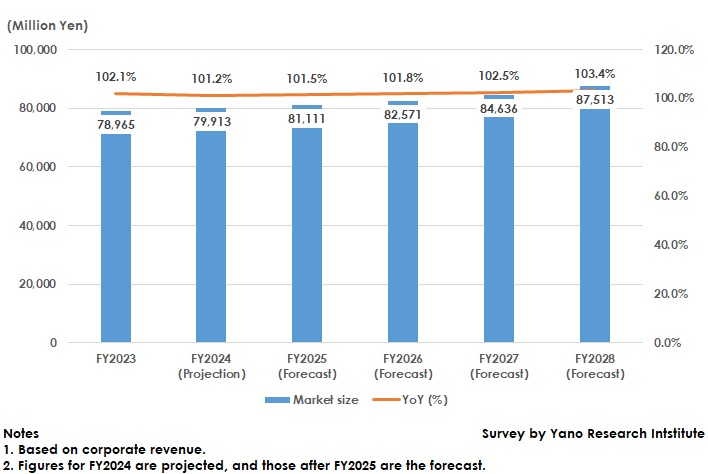No.3683
Municipal Smart City Market in Japan: Key Research Findings 2024
Municipal Smart City Market Forecast to Grow 1.2% YoY to 79,913 Million Yen in FY2024
Yano Research Institute (the President, Takashi Mizukoshi) has conducted a survey on the domestic smart city market and found out the market overview, trends of market players, and future outlook. Here highlights the size of the municipal smart city market and analytic results.

Market Overview
Municipal smart city initiatives began in the 2010s, but many have stalled at the demonstration stage. One of the reasons is funding. A smart city requires an enormous amount of money to plan and develop services, making it difficult for a municipality to shoulder the burden alone, despite its eagerness and enthusiasm. However, with the start of subsidies for the Digital Garden City Nation initiative in FY2022, many municipalities have accelerated their smart city projects. The subsidy for the Digital Garden City Nation initiative is the financial support for municipalities that aim to solve problems in local communities and to revitalize them. The subsidy plays an important role for municipalities that are eager to implement the initiative, as it enables them to move forward with large-scale projects to realize the smart city.
Municipal smart cities are characterized by the utilization of data integration platforms that consolidate data across sectors. Part of the subsidies are granted on the condition that services are generated using these platforms. As a result, the deployment of data integration platforms increased rapidly after FY2022. In FY2023, an increasing number of municipalities have strengthened new services in addition to operating the platform and services. The subsidies have also helped some municipalities to enter new business. These municipal efforts have led the size of the municipal smart city market in terms of corporate revenue to reach 78,965 million yen in FY2023, up 2.1% year on year.
Noteworthy Topics
The Biggest Challenge Is Business Continuity
Municipal smart cities have many challenges for them to continue the business. One of such challenges is difficulty in monetization. Currently, many municipal smart cities depend on subsidies for the Digital Garden City Nation and other initiatives to drive the business. Therefore, they are dependent on the national policy.
Each municipality is responsible for providing administrative services including disaster prevention. Sharing of systems for providing such services with other municipalities is underway thereby reducing the cost of operating and maintaining systems and organizing data integration platforms. Other efforts are in progress to build a scheme for revenue-generating services that can charge beneficiaries as much as possible, such as AI-powered, on-demand taxis and other travel-related services. Building a revenue-generating scheme is essential for the business to continue in the future.
There is also an issue of unsatisfactory user acquisition, although various new services have been generated. As such services are not fully recognized, the municipalities are focusing on improving existing services and user acquisition rather than generating new services.
Future Outlook
The municipal smart city market based on corporate revenue is expected to reach 79,913 million yen in FY2024, up 1.2% year on year.
As some municipalities that have already started the project are looking for revenue generation and are focusing on user acquisition for existing services rather than new business generation, large-scale investment is declining. On the other hand, those municipalities that are new to the smart city project can use the accumulated knowhow of services already launched by other municipalities, which allows them to start the business at a relatively low cost and in a short period of time. As the number of municipalities launching new smart city projects increases, the municipal smart city market is expected to grow slightly hereafter, despite the decline in large-scale investment.
Research Outline
2.Research Object: IT vendors that provide smart-city solutions, municipalities
3.Research Methogology: Face-to-face interviews (online included) by expert researchers, interviews via telephone/email, and literature research
What is the Municipal Smart City Market?
Municipal smart city in this research is defined as the initiative to press ahead with building a smart city by a municipality. The market size has been calculated based on the revenues of companies for design, consulting, city OS, data integration platform, and other various advanced solutions. It excludes smart cities managed by private companies.
According to the Cabinet Office, a smart city in the policy aspect is defined as the city or the region that provides high-quality services and living conditions for people (residents, businesses, and visitors) from social, economic, and environmental perspectives from today to the future by utilizing new ICT and data from public agencies and private enterprises in city management (planning, organization, management, operation), aiming to solve various global and regional problems and create new values.
<Products and Services in the Market>
MaaS, local currency, residential portal, data integration platform, consulting
Published Report
Contact Us
The copyright and all other rights pertaining to this report belong to Yano Research Institute.
Please contact our PR team when quoting the report contents for the purpose other than media coverage.
Depending on the purpose of using our report, we may ask you to present your sentences for confirmation beforehand.